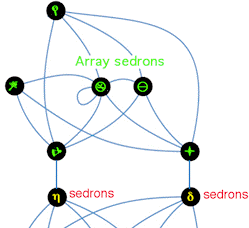"The thing I hope most is that 'Cosmos' will break down our defenses, and we'll awaken from our stupor to protect the ancient continuity of life that science reveals." - Ann Druyan
Bruno was condemned by religious thought police when he made the mistake of thinking for himself rather than sticking to the "party line". The life of Bruno encapsulates the story of the cosmos. As Druyan reminds us, people like Bruno illustrate the human condition, the greatest story ever told: how the universe is awakening from its stupor because of the glorious courage of people like Bruno who are willing to risk speaking out even if it means they will be burned at the stake as a heretic.
 |
| Sagan's spaceship |
Apparently Seth MacFarland was instrumental in finally getting a cosmos reboot onto the boob tube. In Bruno's day there was no shortage of religious fanatics who would condemn and murder heretics and in our time there is still an army of religiously motivated zealots struggling to keep the people of the world subjugated to religious fantasies. Many people in Hollywood won't risk a payday by standing up to the religious blackmailers. Thanks, Seth, for your humor and courage.
Religion in Exode
 |
| Retrograde planetary motion: the epicycle model red dot: Earth as the center of the cosmos |
Bruno was to Copernicus as "the editor" is to Sagan. Let me decompress that statement.
Early in the 1500s Copernicus rejected the epicycles that had come to contaminate geocentric planetary models and he began to champion serious astronomical study of the Sun as the center of planetary organization.
Bruno became something of a popularizer of heliocentrism. Copernicus never stepped too far from the task of matching astronomical observation to mathematical model. In contrast, Bruno was a free spirit, intent on fully exploring the philosophical implications of heliocentric cosmology.
Bruno was among the first people to celebrate human liberation from the psychic claustrophobia imposed by the crystalline sphere of the fixed stars. Bruno enthusiastically explored the idea that the Sun is just one of many stars, the one that happens to be closest to us.
 |
| The Inquisition - what a blast! |
Bruno rebelled against the popular religious idea of a distinction between godly perfection in heaven and evil corruption on Earth. We are star dust. We are golden. Bruno had to ask: do we deserve a religious dogma that condemns our beautiful planet and demands that we live to transcend the reality of daily existence and ascend to a fantasy world of imagined after-death perfection? The Copernican cracks in the celestial sphere were cracks in the power structure of Rome, and Bruno felt compelled to make sure that all the people of the world knew it.
Part of the fun and fantasy of the Exode Trilogy is that I have included a (pseudo)scientific means by which lowly beings like we human actually can transcend the physical existence that we have here on Earth. In the Exode Trilogy there are "hierions" and "sedrons", material particles that have yet to be discovered by human science.
I imagine that the alien Huaoshy long ago discovered sedronic matter and transformed themselves into artificial life forms that exist within the higher dimensional Sedronic Domain. The question becomes: can we humans also transcend our mundane three dimensional existence?
Creators
Bruno, Sagan and other popularizers of science are easy targets, condemned both by religious and scientific orthodoxies. Sagan's science fiction story Contact explored the idea that objective scientific evidence might exist in support of the idea that the universe was created. In Exode, the story revolves around evidence that we humans were created by "space aliens" who subjected Earthly primates to artificial selection. Sagan's imagined "evidence" for a Creator had a mathematical form: a message written in the value of the transcendental number pi (3.14159...). In Exode, the evidence of alien intervention is mostly genetic. While the evidence for a Creator that exists in Exode is right here on Earth, it is only slightly more accessible than the mathematical message in Contact.
Sadly, returning to reality from the land of fiction, all objective evidence seems to support the idea that the cosmos and we humans arose through natural processes without the intervention of any creator. Religious believers and science fiction writers will continue to explore creationist fantasies. Bruno lived before the age of modern science, so I'd want to classify his fringe ideas as fantasy rather than science fiction. Still, his interests in magic and his preference for the idea that divinity pervades and unifies the cosmos fit well with the science fiction of Exode. I've been inserting select historical and religious figures into Exode...it is tempting to include Bruno.
Protecting the ancient continuity of life
In the Exode Trilogy, the aliens who come to Earth and create the human species have a billion year old ethical code: planets like Earth must be protected from species like humans. According to pek breeding protocols, humans were to be gracefully replaced by Prelands.
However, Gohrlay took control of Earth and humanity was set on a course towards developing the technological means to destroy Earth's ecosystem.
 |
| Bruno's vision of an infinite universe. |
What if Bruno's fringe ideas, such a belief that stars and planets are in some way alive (or possibly, more than alive: some type of divinity) were based not on speculative philosophy, but rather, on revealed knowledge, a type of cultural contamination? I'm imagining that Bruno (because of his unusual brain structure) was able to access the Sedronic Domain by means of the bimanoid interface, thus allowing him to recognize that all conventional matter in our familiar three dimensional universe is associated with the artificial life that permeates the Sedronic Domain.
I've previously imagined that a "Thomas clone" named Rechmain was present on Earth during the early1500s and that he teleported Jane Grey out of England in 1554, six years after the birth of Filippo Bruno (he adopted the name "Giordano" only after joining the Dominicans). I'm now imagining that Rechmain "lost control" of some zeptoscale neurodevelopmental control devices and they ended up inside Bruno, giving him an amazing memory capacity and a limited ability to use the Interface.
For the Exode Trilogy, I imagine that Bruno could sense the presence of artificial life in the Sedronic Domain, making it impossible for him to view the stars as mundane lumps of conventional matter.
 |
| Sagan's dream about a galactic fugue of life. The stuff of life - Artificial Selection |
"A Spacetime Odyssey" Episode 2
 |
| Human adults retain juvenile features. |
In "The co-evolution of language and emotions" the authors build upon Dan Dor's interest in how we use our stories to pump the imagination of listeners. Hollywood is a kind of laboratory for the study of how, by triggering the emotional reactions of an audience, the $$$ can keep flowing in to fund a story-telling industry. What are the links between the evolution of human language and emotion? Eva Jablonka et al suggest that a kind of self-domestication process has fine-tuned human social emotions so as to facilitated information-sharing.
A major problem in the Exode Trilogy is a cosmic-scale failure of communication between humans and the alien Huaoshy. If humans have evolved special emotional "tricks" that facilitate communication between humans, can we hope that these human-specific communications tricks will be of any use for information exchange between humans and alien species?
I imagine that the Kac'hin and the Ek'col must be constructed as special tools to facilitate mutual understanding between we humans and the Huaoshy.
If human language has a structure that matches well to human emotional patterns, then how can an author hope to interest human readers in a story about aliens who do not share our emotional programming? What happens when the topics explored in science fiction become too alien to be supported by conventional human story telling?
Biologists have long been interested in the self-domestication of wolves (recent article). Primates like the bonobo might provide us with an opportunity for exploring self-domestication processes that were important early in human evolution.
The Exode Trilogy moves beyond science and weaves a fantasy about alien forces that have artificially selected the unique features of the human species.
Cosmos: episodes 3 - 6
episodes 7-10
episodes 11-13












No comments:
Post a Comment